Few debates about education in the United States are as partisan as the one over school vouchers. Vouchers are government certificates that parents can use to help pay for private schooling for their children. Critics say voucher programs take resources that could go toward public school systems. But the families and students who use vouchers say they provide rare educational opportunities.
It’s a Wednesday morning in physical education class at the Preparatory School of D.C., also known as DC Prep. It’s a private school in the nation’s capital.
The school serves roughly 90 students from pre-kindergarten through high school. With tuition at $11,000 a year, it is expensive for low-income parents with children here. But Lestina Wallace says private school has opened up a whole new world to her daughter Nyjah. “The other school she went to, they did not bring her self esteem up. They made her feel bad about herself and they also told her she could not read," she said.
Nyjah now reads well. She, and many other students here, receive school vouchers from the federal government to help pay for tuition. Parents say the school is a safe and orderly alternative to their neighborhood public schools and that their children are thriving.
“It has given me opportunity to be in a school where I am disciplined and not running wild like in the past," said student Dominique Williams.
Dominique’s father, Joseph Kelly, uses vouchers to fund the private education of his three daughters. Kelly has raised 11 children in all, some from foster care. He says his children struggled in public school. “When I was in public school they (school administrators) hated me to come in," he said. "They wondered, 'What does he want now?' But I go to the private schools and visit any time, ‘Mr. Kelly I am glad to see you!’”
Kelly says he and other parents at DC Prep share common goals. And the concept of school choice, he says, sold him firmly on vouchers. “I deserve the same right as anybody else. If somebody got [has] a million dollars, send their child to private school. I have four dollars. I should be able to send my child to any school," he said.
Long maligned by public school advocates, voucher programs are on the rise across the country.
The Foundation for Education Choice, a pro-voucher group, says legislation friendly to private education has passed or is pending in numerous states. Proposed new laws would provide funding for vouchers and give tax credits to parents choosing private school.
Powerful conservatives back the movement. But critics say vouchers put the country on a path toward complete school privatization.
Washington Mayor Vincent Gray is among the critics. His own police arrested him when he took part in a protest that included opposition to the federal government imposing the voucher system on Washington.
Nathan Saunders, president of the Washington Teachers Union, says the rising prominence of vouchers is a troubling trend. "What vouchers do is fundamentally take the conversation away from improving public schools. It puts that conversation on the back burner," he said.
And he adds that parents choices are not widely expanded. "The voucher that the student in D.C. receives is equivalent to approximately $7,500. Well if you want to go to the school President Obama sends his kids to, that costs about $30,000. So where do you make up that gap? You don't," he said.
Strong feelings run on both sides of the debate, and a U.S. Department of Education study offers arguments for each. The study shows modest improvement on reading scores among voucher students in private schools in Washington, but not on math. Still, graduation rates are higher among voucher students and their parents say they are much more satisfied. And so, it appears, are their children.






